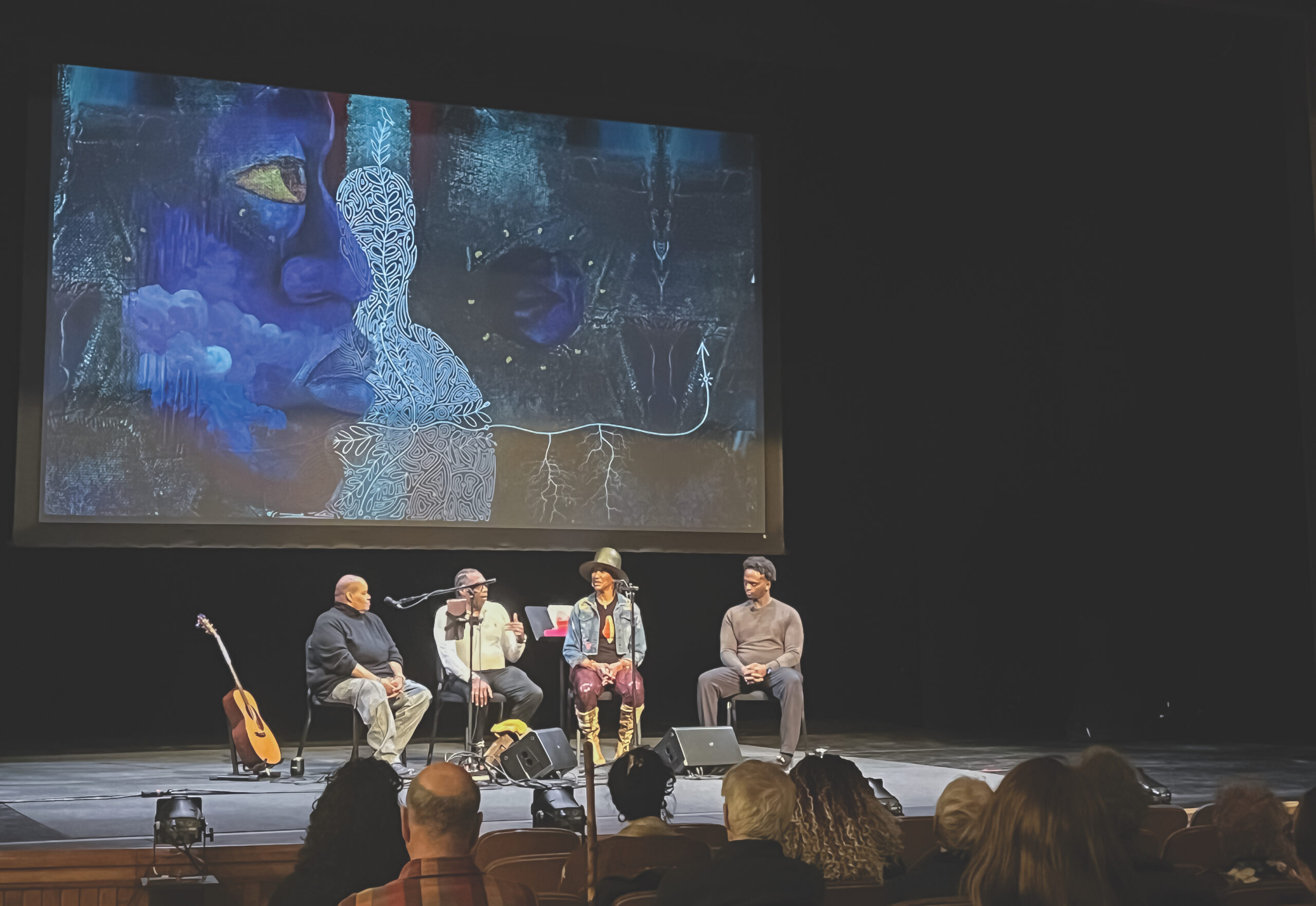Continuing on the Parable Path with word and song
March 29, 2024
 Lily Echeverria
Lily EcheverriaLast night, the Parable Path Maine initiative brought conversation to Pickard Theater through the blending of multiple media forms encapsulated under the name “‘Are There Any Rights I’m Entitled To?’ Carceration and Liberatory Futures.” The event was inspired by discussions among activists about mass incarceration in the United States in recent years and aims to prompt Bowdoin and the Brunswick community to think about different paths forward away from imprisonment.
Parable Path Maine is led by 2022-23 Joseph McKeen Visiting Fellow Toshi Reagon in collaboration with the McKeen Center for the Common Good, Indigo Arts Alliance and the Maine Humanities Council. The initiative is guided by Afrofuturist themes present in Octavia Butler’s 1993 science-fiction novel “Parable of the Sower.”
The event opened with a film screening of “Angola Do You Hear Us?” a short film about artist Liza Jessie Peterson’s performance that she brought to 35 prisons nationwide. The performance was entitled “The Peculiar Patriot” and also exists as a book.
The film specifically focuses on her performance at the Louisiana State Penitentiary, also known as Angola, in which Peterson is halted halfway through and forced to stop by the guards. The work addresses systemic injustices in the prison system and its connections to slavery. The prison is located on the site of a former slave plantation and is called Angola in reference to the African country of the same name from which many enslaved people in Louisiana were forcibly taken.
“I cried, watching the performance,” an incarcerated man said in the film. “Every aspect of this particular play, [we] have seen. I saw a lot of tears in the audience.”
After the film screening, Peterson and Reagon took to the stage. The women struck a conversational tone with the audience, referencing weather issues and personal anecdotes before beginning their performances.
“It’s good to be in community,” Peterson said as she settled into her seat. “Especially now.”
Reagon first sang with the accompaniment of her acoustic guitar, followed by a poetic piece performed by Peterson. Reagon wrapped up the performance segment of the evening with a closing song that was met with great enthusiasm from the audience.
A panel followed, with Reagon and Peterson joined by Joseph Jackson and Ali Ali, both advocates for new perspectives on containment. Jackson is the executive director of Maine Prisoner Advocacy Coalition and interim co-executive director of community programs at Maine Inside Out, and Ali is the director of advocacy of Maine Youth Justice, a campaign agitating for the closure of Maine’s last juvenile prison facility, Long Creek Youth Development Center.
Ali was incarcerated at 14 years old. He is now 28, but remembers when Maine Inside Out visited his facility and gave him and others incarcerated at the facility the opportunity to engage with the arts.
“As we created theater, we started telling our own stories, and we conducted a play of seven individuals that [represented] our lives, and we performed it in front of the incarcerated youth,” Ali said. “They loved it. I’m talking about the toughest kids in the state.”
The play then led to an opportunity for Ali and other juvenile inmates to perform at the University of Southern Maine in front of hundreds of people. The show ended in a standing ovation, accompanied by tears from audience members and performers alike.
The panel discussed the impact of art on the lives of incarcerated people as well as its ability to inspire concrete change to the carceral system. Peterson referenced a situation in which she reunited with an incarcerated man who told her how much her art had affected Angola.
“[He told me], ‘After your performance, two years later to the day, 300 men have been released,’” she said. “My director and I looked at each other and said, ‘Well what does that have to do with us?’”
The man went on to tell her how Peterson brought inspiration to Angola, the largest maximum-security prison in the United States. Her performance provoked family members of some of the incarcerated men to take political action, enough so to get two Black female judges elected in Louisiana. The judges were at a screening of Peterson’s film, and said that cases that would usually be rejected are receiving a second look after seeing her work.
Jackson, who has also spent time in prison, reflected on what it was like to see his own experience and circumstances reflected in the film.
“When those outside eyes began to see what was going on inside, it made a difference,” he said. “It’s the reason why I became an advocate. It’s the reason why we do the work on the outside, and this film is what ‘inside’ looks like, and the feeling that men have there.”
Assistant Professor of English Samia Rahimtoola attended the event, after speaking as a panelist in last October’s Parable Path event. Her current Poetry and the City class relates closely to the way that the panelists spoke about the power of art.
“I was really inspired by the notion of activation through art,” Rahimtoola said.
The performance will repeat—with different panelists—in Portland tonight at Mechanics’ Hall at 7:00 p.m.
Reagon closed the Pickard event with words of hope for the present moment.
“This is our time,” she said. “This is our time to really get ferocious and open our hearts, and invigorate through the vibration of art, the vibration of togetherness.”

Comments
Before submitting a comment, please review our comment policy. Some key points from the policy: